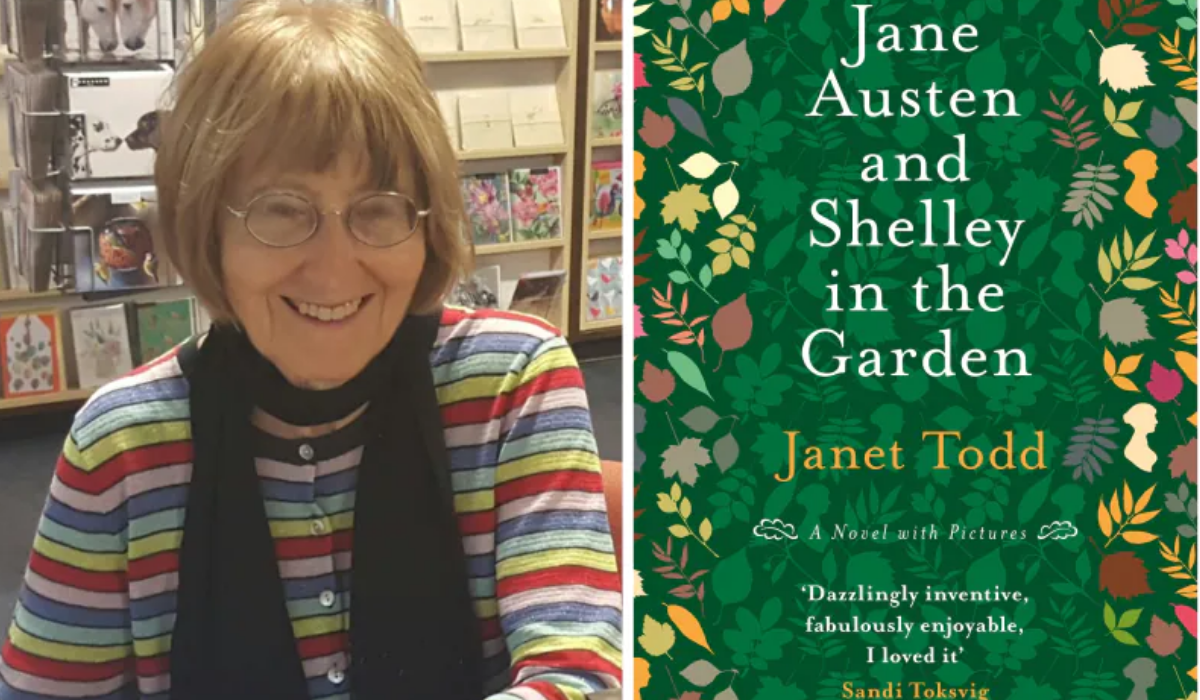An interview with Janet Todd, Lucy Cavendish Honorary Fellow and former President
What’s your new book about and what is the inspiration behind it?
The inspiration was Lockdown and the need to create a novel without further research in libraries! I have relished the freedom of retirement (though loved my time as President of Lucy Cavendish) and have enjoyed the change of career it has made possible. Since retiring in 2015 I have written three novels and a sort of autobiography. The first two novels, A Man of Genius and Don’t You Know There’s A War On?, were set in the Regency period and in post-war England: they were dark studies of loneliness and obsession. This latest one, Jane Austen and Shelley in the Garden, is contemporary and far lighter! It concerns three friends from different backgrounds wondering quite what to do with the later part of life. As the blurb puts it, ‘The novel is a gentle meditation on age, friendship, mortality, hope, and the excitement of change.’
Could you tell us about your career as a novelist and scholar?
I was an academic for over half a century. An exciting time since I began my career in America when feminism was just beginning. In the late 1960s and 1970s I worked on women writers who were largely unknown, including—and this is now hard to believe—Mary Wollstonecraft. I edited her work along with many other women writers like Aphra Behn and Charlotte Smith, and I wrote a series of interlinked biographies about women making their way in a man’s world and coping with the restrictions this world imposed. In recent years I have settled with wonderful Jane Austen: I have written critical books about her, collected essays, and been the general editor of the Cambridge edition of all her works.
On retirement and not needing to worry so much about peer pressure and critical reviews, I felt at last I had the confidence to publish imaginative work and I began creating the fiction I always wanted to write.
As you will know, when I was President, along with Sophie Hannah I started the Lucy Cavendish Fiction Prize: it is a great pleasure to see that, with the help (among others) of my former colleagues Isobel Maddison and Lindsay Traub, and my successor Jackie Ashley, it has gone from strength to strength. Congratulations to all concerned.
What would be your advice to students who wanted to pursue a similar career?
Times have changed so radically that my advice is irrelevant! Social media and self-publishing have changed everything. But, for what it is worth: I would say to a would-be novelist that she should follow her bent and her own style and not be too constrained by fashion and the prevailing genres and subjects. On a practical level: it is possible now, as it wasn’t when I was young, to earn a living teaching creative writing while writing oneself. Also, while the bestseller that will give the novelist a real income needs a hefty amount of luck and should not be counted on, it is possible to make a modest career combining fiction with more marketable non-fiction-- biography, science, general information texts etc which can be aimed at different ages and groups.
However--unless, the itch to write is overwhelming, it is probably more prudent to do something that provides a nicely secure living without the anxieties and pains of publishing!
What do you think is different or unique about Lucy Cavendish College and why did you want to be part of it?
Well, the College is now so different that I can speak only of the past.
I had been a single parent for many years and had pursued my graduate studies while working; so I was enormously attracted to an institution that could support women who had children or other domestic commitments and no great resources. I know how easy it is to miss out on higher education if you do not come from an educated background where progressing to university is assumed. Lucy Cavendish seemed made for such people—and for those whose intellectual development came after the magic age of 18. The idea of a college for mature women was immensely appealing—and it was a great privilege and honour to be elected as its President.
I now understand that the mission concerns the disadvantaged of both sexes. I can only applaud this greater inclusiveness. I look forward to watching the College which I love developing in new and exciting ways.
From the Washington Post Books
Jane Austen makes a cameo in a charming new novel about friendship and the literary life
“Jane Austen and Shelley in the Garden” by Janet Todd (Courtesy of the author; Fentum Press)
Review by Carole Burns
September 10, 2021 at 8:00 a.m. EDT
As summer wanes, here’s one more title for your reading list, especially if you prefer your novels literary but light: “Jane Austen and Shelley in the Garden.” In this delightful — and very British — novel, Virginia Woolf, William Wordsworth, Elizabeth Bishop, Samuel Johnson and Lord Byron all make cameos, along with, of course, Jane Austen.
The book, set in contemporary England, focuses on three older women facing retirement and the regrets that age often brings. The central character, Fran, already at the fringe of university life, lives in a cottage in the countryside, where the main companion in her garden is the author of “Pride and Prejudice,” who makes a ghostly appearance.
Fran is coaxed to Cambridge by another older woman facing the same problem, and as she mixes with academics there, both older and younger, the five of them form an oddly matched group that bonds over a common project: to trace Percy Shelley’s life. When they set off for Wales and Venice, “Jane Austen” comes along.




